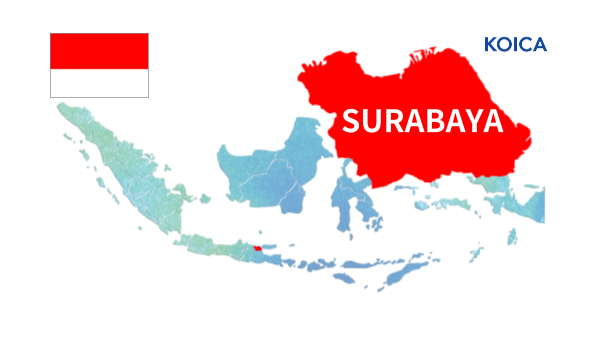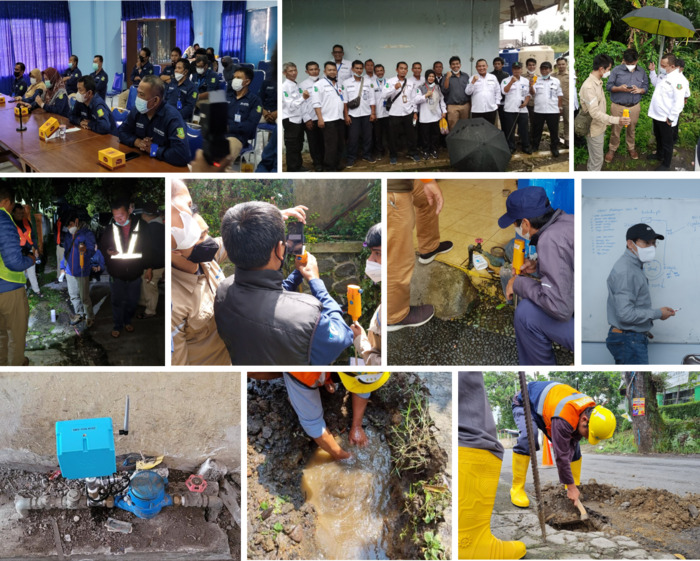Title: Water Leak Detection and MNF Reduction Project in Surabaya
Period: September – February, 2024 (6 months)
Introduction
What is Minimum Night Flow and Why is it Important?
In this project, a comprehensive leak reduction system (NELOW) was implemented for PDAM Surya Sembada Kota Surabaya (Surabaya Water Authority). The goal was to provide an integrated leak reduction service capable of monitoring both flow and pressure in the project area. After establishing the NELOW system in Surabaya, primary and secondary leak detection activities were conducted, leak points were identified and isolated, pressure monitoring equipment was installed, and flow data collection was carried out.

NRW Status
How MNF Analysis Improves Water Leak Detection in Surabaya
Surabaya faces a high NRW rate of 31.06% due to aging pipelines, pressure-induced leaks, and malfunctioning water meters. With no specialized leak management companies in the city, PDAM Surya Sembada relies on its own NRW team, consisting of only six members as of 2024. PDAM Surabaya has shown strong interest and commitment to building internal capacity for water loss management, making it an ideal fit for the services provided by WI.Plat.
Local Partner

SUPRA International, a partner of WI.Plat since 2021, has actively operated in Indonesia through technology transfer from WI.Plat. In this project, SUPRA’s engineers and project managers played a pivotal role, demonstrating their expertise and capabilities.
Key Activities
Here are the key onsite activities performed during the project.
- Baseline Survey & GIS Data Collection: Baseline data was collected on the ① water supply system, ② water supply system operations, and ③ water supply system operating agency within the pilot project area. GIS data was provided to implement it to NELOW server. The project area encompassed a total of 7,150 service connections.
- System Training for PDAM Surabaya: Before the main project activities began, training sessions on water loss management using the NELOW system and equipment operation were conducted. Capacity-building sessions for local managers were also held in separate modules. An in-depth discussion was held on leak inspection methods suited to the local conditions in Surabaya.

- Water flow data collection: MNF (Minimum Night Flow) measurements were conducted at the beginning and end of the leak reduction project to assess the reduction in water loss.

- Leak Inspection: Leak inspection work was initiated using Sonic GL. In this phase, leak sound data is collected from water meters and valves located within the project area. The inspection was conducted over approximately five months, including the rainy season (1 to 1.5 months). A team of four from SUPRA and two from PDAM Surabaya carried out the inspection work together.
- Leak Validation: Based on the analysis of data collected during the inspection phase, a total of 40 potential leak points were identified. In this process, field operators also need to assess whether there are any nearby pumping stations or other factors that could generate leak-like sounds in the suspected areas.
- Leak Detection: For 40 suspected leak points, inspections were conducted along the pipelines identified through GIS data. WI.Plat’s local partner, SUPRA, ultimately pinpointed 34 confirmed leak locations. These leaks were identified solely through the capabilities of local personnel who had received capacity-building training and system training.
- Remote Pressure Monitoring: In the third week of January 2024, installation of 15 Sonic M2 remote pressure monitoring devices was completed, with data upload status confirmed as operational. Nighttime Maximum Fixed Pressure (MFP) measurements were set to occur between 3 a.m. and 5 a.m. Out of the five DMAs, unusual pressure data changes were observed in two zones. PDAM staff identified leaks in areas where pressure dropped. This pressure data monitoring confirmed that leak management through pressure monitoring is feasible in Indonesia.
- AI Customizing: WI.Plat will leverage the collected data from this project to customize an AI model, enhancing its accuracy for future initiatives in Indonesia. The unique sound profiles captured are specific to the region, influenced by the local network infrastructure and water pressure conditions. By tailoring the AI model to these distinct characteristics, we aim to improve leak detection capabilities, ensuring more effective management of water resources in future projects.
Outcomes of MNF-Based Leak Management in Surabaya
The project yielded significant results:

- 34 Leak Points Identified
- 30% of MNF Reduction: Flow data validation showed a 32.11% reduction in the maximum night flow for the existing isolated block, decreasing from 1,600.56 tons to 1,086.8 tons.
- Sound Data Collected: 6,168 sound data is collected from the project including leak sounds, and even today the managers of PDAM Surabaya is collecting leak sound for detection.
- Capacity Building of 23 Engineers: Not only has WI.Plat’s partner, SUPRA, but also PDAM Surabaya’s leak management team completed training to use the NELOW system and continue to actively utilize the equipment and system. PDAM Surabaya is committed to ongoing water loss management, viewing this effort not as a one-time project but as a continuous initiative to reduce water loss effectively.
The Surabaya project underscored the effectiveness of intelligent water management solutions in Indonesia. WI.Plat’s NELOW system proved its capability to efficiently detect leaks and enable collaboration between local teams and international expertise. This project establishes a foundation for future water management initiatives in Southeast Asia, promoting enhanced water conservation and resource efficiency. By integrating advanced technology with local expertise, the project offers a sustainable approach to reducing NRW and improving the overall efficiency of water distribution networks.










